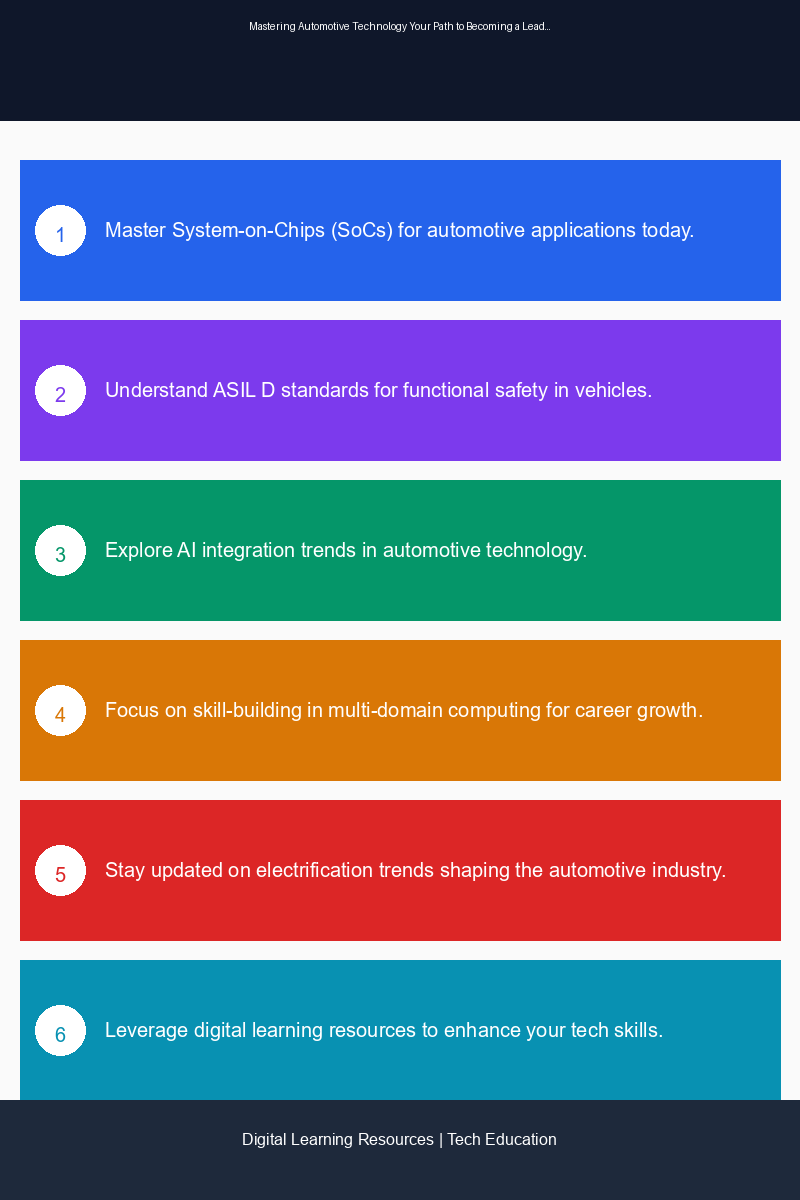Key Takeaways: Explore the intricate world of System-on-Chips (SoCs) for automotive applications, understand multi-domain computing, and delve into ASIL D standards. Learn about emerging trends in AI integration, electrification, and the importance of skill-building in this dynamic industry.
Introduction
The automotive industry is undergoing a significant transformation, driven largely by advancements in semiconductor technology and artificial intelligence. As developers and IT professionals, understanding these innovations is not just beneficial—it’s essential. This blog post will guide you through the technical concepts of SoCs, functional safety standards, and the burgeoning trends in automotive technology, while also providing actionable insights into your career development and learning paths in this exciting domain.
Technical Background and Context
At the heart of modern automotive systems lies the System-on-Chip (SoC), which integrates various components, including processors, memory, and interfaces, into a single chip. This integration is crucial for applications such as automated driving and advanced driver-assistance systems (ADAS). Key technologies shaping the landscape include:
📚 Recommended Digital Learning Resources
Take your skills to the next level with these curated digital products:
Academic Calculators Bundle: GPA, Scientific, Fraction & More
Academic Calculators Bundle: GPA, Scientific, Fraction & More
ACT Test (American College Testing) Prep Flashcards Bundle: Vocabulary, Math, Grammar, and Science
ACT Test (American College Testing) Prep Flashcards Bundle: Vocabulary, Math, Grammar, and Science
📊 Key Learning Points Infographic

Visual summary of key concepts and actionable insights
Leonardo.Ai API Mastery: Python Automation Guide (PDF + Code + HTML
Leonardo.Ai API Mastery: Python Automation Guide (PDF + Code + HTML
100 Python Projects eBook: Learn Coding (PDF Download)
100 Python Projects eBook: Learn Coding (PDF Download)
HSPT Vocabulary Flashcards: 1300+ Printable Study Cards + ANKI (PDF)
HSPT Vocabulary Flashcards: 1300+ Printable Study Cards + ANKI (PDF)
- Multi-domain Computing: This allows multiple operating systems to run concurrently on the same hardware, enabling complex applications to utilize resources more efficiently.
- ASIL D Functional Safety Standards: Compliance with these standards is critical for automotive systems, ensuring reliability and safety in mission-critical applications.
- Mixed-criticality Workloads: The ability to support different workload types on the same hardware is fundamental in balancing performance and safety.
Practical Applications and Use Cases
Understanding these technical concepts opens the door to various practical applications. Here are some scenarios where SoCs and advanced technologies are making a difference:
- Automated Driving: The NVIDIA Drive Thor superchip integrates AI for real-time decision-making, enhancing vehicle autonomy and safety.
- Digital Cockpits: Qualcomm’s Snapdragon Ride Flex SoC family enables seamless integration of infotainment and ADAS functionalities, creating a more connected and efficient driving experience.
- Vision-Based ADAS: Intel’s Mobileye EyeQ Ultra utilizes advanced computer vision algorithms to improve situational awareness and safety in autonomous vehicles.
Learning Path Recommendations
As the automotive sector evolves, so too does the need for specialized knowledge. Here are recommended courses and training programs to consider:
- Semiconductor Technology Courses: These focus on the design and application of semiconductors in automotive systems and provide foundational knowledge in chip design.
- AI Chip Design and Development Training: Learning power-efficient architectures is key in developing next-generation AI chips that support automotive applications.
- Automotive Electronics Programs: These programs cover vehicle electronic architecture and integration techniques necessary for modern vehicles.
Industry Impact and Career Implications
The automotive landscape is shifting towards electrification, AI integration, and autonomous driving technologies. This transformation presents numerous career opportunities:
- AI and Machine Learning Specialists: Proficiency in AI inference and near-memory computing will be vital in developing intelligent automotive systems.
- Automotive Safety Engineers: Understanding ASIL D standards and their application will be crucial for ensuring the safety of modern vehicles.
- Systems Engineers: Skills in developing and integrating complex AI workloads will be in high demand as vehicles become more autonomous.
Implementation Tips and Best Practices
As you delve into the automotive technology space, consider these best practices:
- Stay Updated: Regularly follow industry news, attend webinars, and join professional organizations to stay ahead of trends.
- Build a Portfolio: Engage in projects that involve AI, SoC design, or automotive systems to showcase your skills to potential employers.
- Network: Connect with industry professionals through conferences and online platforms to learn and explore new opportunities.
Future Trends and Skill Requirements
The future of automotive technology will likely see:
- Increased AI Capabilities: Continued integration of AI into automotive systems will require developers to have strong backgrounds in machine learning and data analytics.
- Electrification and Sustainability: Knowledge in battery technology and electric vehicle systems will become increasingly important.
- Resilient Sourcing: Understanding supply chain dynamics and advanced chip development will be crucial to mitigate vulnerabilities.
Conclusion with Actionable Next Steps
As the automotive industry continues to evolve, the demand for skilled professionals who can navigate these changes will only grow. To position yourself for success:
- Identify and enroll in relevant courses that align with your career goals.
- Engage in hands-on projects to gain practical experience and build your portfolio.
- Network with industry professionals and stay informed about the latest trends and technologies.
By investing in your education and skills development today, you’ll be well-equipped to lead in the rapidly changing world of automotive technology.
Disclaimer: The information in this article has been gathered from various reputed sources in the public domain. While we strive for accuracy, readers are advised to verify information independently and consult with professionals for specific technical implementations.
Ready to advance your tech career? Explore our digital learning resources including programming guides, certification prep materials, and productivity tools designed by industry experts.
